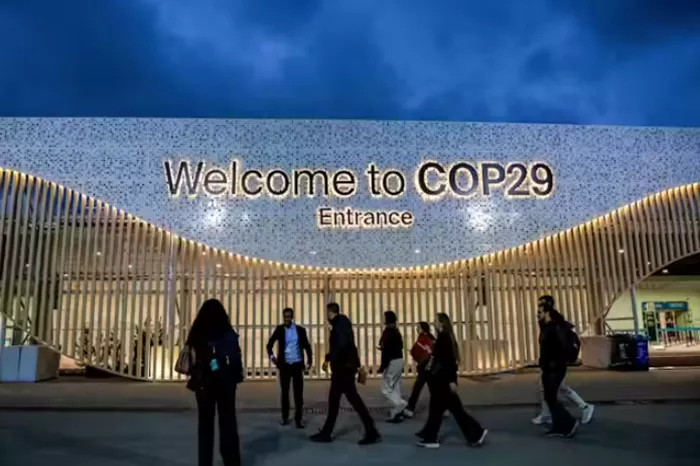Executives from major oil companies gathered in Baku on Friday for “Energy Day” at the COP29 climate summit, as environmental groups expressed outrage over the continued presence of fossil fuel industry lobbyists at the United Nations climate talks.
As negotiators engage in closed-door discussions focused on securing increased climate finance for developing nations, oil industry leaders—including executives from France’s TotalEnergies—are holding side events, raising concerns over the influence of fossil fuel interests on the proceedings.
The NGO coalition “Kick the Big Polluters Out” (KBPO) analyzed the list of accreditations at the summit and found that over 1,700 individuals affiliated with fossil fuel companies are in attendance. “It’s like tobacco lobbyists at a conference on lung cancer,” said David Tong from campaign group Oil Change International, highlighting the growing controversy surrounding the fossil fuel sector’s involvement in climate negotiations.
This is not the first time that the presence of oil, gas, and coal representatives at COP meetings has sparked debate. The appointment of Sultan Al Jaber, head of the UAE’s state oil company, as president of COP28 last year, drew sharp criticism. Similarly, this year’s host, Azerbaijan, a major oil and gas producer, has defended the continued reliance on fossil fuels, with President Ilham Aliyev reiterating his belief that natural resources are a “gift of God.”
Former U.S. Vice President and prominent climate advocate Al Gore condemned the increasing control that fossil fuel-rich nations have over the COP process. “It’s unfortunate that the fossil fuel industry and the petrostates have seized control of the COP process to an unhealthy degree,” Gore remarked Thursday, noting that while COP28 produced a global agreement on the need to “transition away” from fossil fuels, the follow-up actions have been “weak” and the issue is barely mentioned at COP29.
Several leading climate activists and scientists have called for a reform of the COP process, declaring it “no longer fit for purpose.” In a letter signed by prominent figures such as former UN Secretary-General Ban Ki-moon, they urged for smaller, more frequent meetings with greater accountability and stricter rules for host countries. They also demanded that companies prove their commitment to climate action before being allowed to send lobbyists to the talks.
The KBPO coalition highlighted the presence of corporate representatives from companies with fossil fuel ties in various national delegations. Japan, for instance, brought employees from the coal giant Sumitomo, while Canada included representatives from oil producers Suncor and Tourmaline, and Italy sent staff from energy companies Eni and Enel. Notably, some of the individuals listed by the NGOs work for companies not primarily linked to fossil fuels, such as Danish offshore wind leader Orsted.
Responding to the criticism, a spokesperson for TotalEnergies defended the company’s participation, stating that the firm is on track to meet its “ambitious” emissions reduction targets and that its employees had no access to the negotiations themselves.
The COP29 summit, which has seen over 53,000 registrations from participants—excluding technical and support staff—continues to be dominated by discussions around climate finance. The primary focus of the talks remains securing a new commitment for climate financing to help developing countries mitigate the effects of climate change and transition their economies away from fossil fuels.
Rich nations, however, remain reluctant to increase their financial contributions beyond the $100 billion per year already pledged, citing economic challenges at home, including inflation and sluggish growth. Developing nations, on the other hand, are calling for at least $1 trillion in funding to safeguard against the impacts of climate change and to meet global net-zero emission targets.
Negotiators are struggling to finalize a draft text ahead of next week, when ministers are expected to begin formal discussions aimed at finalizing an agreement. Looming over the talks is uncertainty about the role the United States will play in climate action and financing if former President Donald Trump returns to the White House in January. Trump has promised to withdraw again from the landmark Paris Agreement, raising doubts about the U.S. commitment to global climate goals.
Despite these challenges, Al Gore remains optimistic about the momentum behind climate action. “There is so much more momentum that even a new Trump administration is not going to be able to slow it down much,” Gore asserted, echoing a sentiment shared by other American participants at the summit. “I hope I’m right about that,” he added.
Related topic:
Which Fossil Fuel Is The Cleanest Burning?
Exxon Mobil Reaches Milestone in Guyana, Signals Offshore Energy Boom

